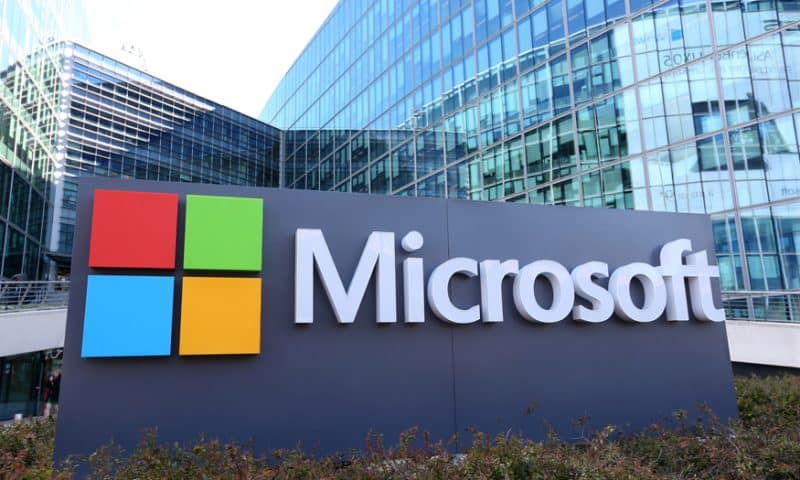Microsoft Co. (NASDAQ:MSFT) – Stock analysts at Piper Jaffray Companies increased their FY2020 earnings per share estimates for shares of Microsoft in a report issued on Thursday, April 25th. Piper Jaffray Companies analyst A. Zukin now anticipates that the software giant will post earnings per share of $5.07 for the year, up from their prior estimate of $4.96. Piper Jaffray Companies currently has a “Overweight” rating and a $140.00 price target on the stock. Piper Jaffray Companies also issued estimates for Microsoft’s Q4 2020 earnings at $1.37 EPS, Q1 2021 earnings at $1.37 EPS, Q2 2021 earnings at $1.28 EPS, Q3 2021 earnings at $1.49 EPS and FY2021 earnings at $5.66 EPS.
Several other equities research analysts have also issued reports on the stock. JPMorgan Chase & Co. increased their target price on shares of Microsoft from $125.00 to $145.00 and gave the stock a “buy” rating in a report on Thursday, April 25th. Bank of America raised shares of Microsoft to a “buy” rating and reduced their target price for the stock from $150.00 to $140.00 in a report on Monday, January 28th. They noted that the move was a valuation call. Credit Suisse Group reissued a “buy” rating on shares of Microsoft in a report on Wednesday, January 2nd. Royal Bank of Canada reissued a “buy” rating and issued a $124.00 target price on shares of Microsoft in a report on Monday, January 21st. Finally, Goldman Sachs Group set a $131.00 target price on shares of Microsoft and gave the stock a “buy” rating in a report on Wednesday, April 24th. One investment analyst has rated the stock with a sell rating, three have assigned a hold rating, twenty-eight have issued a buy rating and three have issued a strong buy rating to the company. Microsoft currently has a consensus rating of “Buy” and an average price target of $133.87.
Microsoft stock opened at $130.60 on Monday. The company has a market capitalization of $1,000.13 billion, a P/E ratio of 33.66, a PEG ratio of 2.33 and a beta of 1.22. Microsoft has a 12-month low of $92.45 and a 12-month high of $131.37. The company has a quick ratio of 3.08, a current ratio of 2.97 and a debt-to-equity ratio of 0.70.
Microsoft (NASDAQ:MSFT) last released its earnings results on Wednesday, April 24th. The software giant reported $1.14 earnings per share (EPS) for the quarter, topping the Thomson Reuters’ consensus estimate of $1.00 by $0.14. The company had revenue of $30.57 billion during the quarter, compared to analyst estimates of $29.86 billion. Microsoft had a net margin of 28.58% and a return on equity of 39.34%. The firm’s quarterly revenue was up 14.0% compared to the same quarter last year. During the same period in the prior year, the firm posted $0.95 EPS.
The business also recently disclosed a quarterly dividend, which will be paid on Thursday, June 13th. Shareholders of record on Wednesday, May 15th will be issued a dividend of $0.46 per share. This represents a $1.84 dividend on an annualized basis and a yield of 1.41%. The ex-dividend date is Wednesday, May 15th. Microsoft’s dividend payout ratio (DPR) is currently 47.42%.
In related news, EVP Christopher C. Capossela sold 10,500 shares of the firm’s stock in a transaction on Monday, March 11th. The shares were sold at an average price of $111.48, for a total value of $1,170,540.00. Following the completion of the transaction, the executive vice president now directly owns 156,866 shares of the company’s stock, valued at $17,487,421.68. The transaction was disclosed in a legal filing with the SEC, which is available at the SEC website. Also, CMO Christopher C. Capossela sold 5,000 shares of the firm’s stock in a transaction on Friday, March 8th. The shares were sold at an average price of $110.46, for a total transaction of $552,300.00. Following the completion of the transaction, the chief marketing officer now directly owns 156,866 shares of the company’s stock, valued at $17,327,418.36. The disclosure for this sale can be found here. Over the last ninety days, insiders have sold 333,667 shares of company stock valued at $35,657,016. Insiders own 1.38% of the company’s stock.
Several hedge funds have recently bought and sold shares of the stock. Vanguard Group Inc lifted its position in Microsoft by 1.6% in the third quarter. Vanguard Group Inc now owns 577,877,949 shares of the software giant’s stock worth $66,091,902,000 after buying an additional 8,820,439 shares during the last quarter. BlackRock Inc. lifted its position in Microsoft by 0.6% in the fourth quarter. BlackRock Inc. now owns 507,006,157 shares of the software giant’s stock worth $51,496,613,000 after buying an additional 3,257,514 shares during the last quarter. FMR LLC lifted its position in Microsoft by 5.2% in the fourth quarter. FMR LLC now owns 254,905,697 shares of the software giant’s stock worth $25,890,773,000 after buying an additional 12,660,256 shares during the last quarter. Oregon Public Employees Retirement Fund lifted its position in Microsoft by 9,587.0% in the fourth quarter. Oregon Public Employees Retirement Fund now owns 169,992,326 shares of the software giant’s stock worth $1,674,000 after buying an additional 168,237,479 shares during the last quarter. Finally, Geode Capital Management LLC lifted its position in Microsoft by 7.6% in the fourth quarter. Geode Capital Management LLC now owns 100,083,231 shares of the software giant’s stock worth $10,148,710,000 after buying an additional 7,107,312 shares during the last quarter. 72.94% of the stock is owned by hedge funds and other institutional investors.
Microsoft Company Profile
Microsoft Corporation develops, licenses, and supports software, services, devices, and solutions worldwide. Its company’s Productivity and Business Processes segment offers Office 365 commercial products and services, such as Office, Exchange, SharePoint, Skype for Business, Microsoft Teams, and related Client Access Licenses (CALs); Office 365 consumer services, including Skype, Outlook.com, and OneDrive; LinkedIn online professional network; and Dynamics business solutions comprising financial management, enterprise resource planning, customer relationship management, supply chain management, and analytics applications for small and medium businesses, large organizations, and divisions of enterprises.

